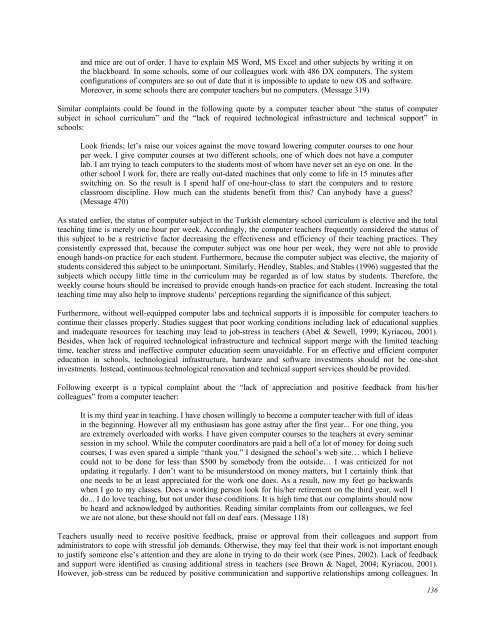October 2007 Volume 10 Number 4 - Educational Technology ...
October 2007 Volume 10 Number 4 - Educational Technology ...
October 2007 Volume 10 Number 4 - Educational Technology ...
You also want an ePaper? Increase the reach of your titles
YUMPU automatically turns print PDFs into web optimized ePapers that Google loves.
and mice are out of order. I have to explain MS Word, MS Excel and other subjects by writing it on<br />
the blackboard. In some schools, some of our colleagues work with 486 DX computers. The system<br />
configurations of computers are so out of date that it is impossible to update to new OS and software.<br />
Moreover, in some schools there are computer teachers but no computers. (Message 319)<br />
Similar complaints could be found in the following quote by a computer teacher about “the status of computer<br />
subject in school curriculum” and the “lack of required technological infrastructure and technical support” in<br />
schools:<br />
Look friends; let’s raise our voices against the move toward lowering computer courses to one hour<br />
per week. I give computer courses at two different schools, one of which does not have a computer<br />
lab. I am trying to teach computers to the students most of whom have never set an eye on one. In the<br />
other school I work for, there are really out-dated machines that only come to life in 15 minutes after<br />
switching on. So the result is I spend half of one-hour-class to start the computers and to restore<br />
classroom discipline. How much can the students benefit from this? Can anybody have a guess?<br />
(Message 470)<br />
As stated earlier, the status of computer subject in the Turkish elementary school curriculum is elective and the total<br />
teaching time is merely one hour per week. Accordingly, the computer teachers frequently considered the status of<br />
this subject to be a restrictive factor decreasing the effectiveness and efficiency of their teaching practices. They<br />
consistently expressed that, because the computer subject was one hour per week, they were not able to provide<br />
enough hands-on practice for each student. Furthermore, because the computer subject was elective, the majority of<br />
students considered this subject to be unimportant. Similarly, Hendley, Stables, and Stables (1996) suggested that the<br />
subjects which occupy little time in the curriculum may be regarded as of low status by students. Therefore, the<br />
weekly course hours should be increased to provide enough hands-on practice for each student. Increasing the total<br />
teaching time may also help to improve students’ perceptions regarding the significance of this subject.<br />
Furthermore, without well-equipped computer labs and technical supports it is impossible for computer teachers to<br />
continue their classes properly. Studies suggest that poor working conditions including lack of educational supplies<br />
and inadequate resources for teaching may lead to job-stress in teachers (Abel & Sewell, 1999; Kyriacou, 2001).<br />
Besides, when lack of required technological infrastructure and technical support merge with the limited teaching<br />
time, teacher stress and ineffective computer education seem unavoidable. For an effective and efficient computer<br />
education in schools, technological infrastructure, hardware and software investments should not be one-shot<br />
investments. Instead, continuous technological renovation and technical support services should be provided.<br />
Following excerpt is a typical complaint about the “lack of appreciation and positive feedback from his/her<br />
colleagues” from a computer teacher:<br />
It is my third year in teaching. I have chosen willingly to become a computer teacher with full of ideas<br />
in the beginning. However all my enthusiasm has gone astray after the first year... For one thing, you<br />
are extremely overloaded with works. I have given computer courses to the teachers at every seminar<br />
session in my school. While the computer coordinators are paid a hell of a lot of money for doing such<br />
courses, I was even spared a simple “thank you.” I designed the school’s web site… which I believe<br />
could not to be done for less than $500 by somebody from the outside… I was criticized for not<br />
updating it regularly. I don’t want to be misunderstood on money matters, but I certainly think that<br />
one needs to be at least appreciated for the work one does. As a result, now my feet go backwards<br />
when I go to my classes. Does a working person look for his/her retirement on the third year, well I<br />
do... I do love teaching, but not under these conditions. It is high time that our complaints should now<br />
be heard and acknowledged by authorities. Reading similar complaints from our colleagues, we feel<br />
we are not alone, but these should not fall on deaf ears. (Message 118)<br />
Teachers usually need to receive positive feedback, praise or approval from their colleagues and support from<br />
administrators to cope with stressful job demands. Otherwise, they may feel that their work is not important enough<br />
to justify someone else’s attention and they are alone in trying to do their work (see Pines, 2002). Lack of feedback<br />
and support were identified as causing additional stress in teachers (see Brown & Nagel, 2004; Kyriacou, 2001).<br />
However, job-stress can be reduced by positive communication and supportive relationships among colleagues. In<br />
136

















